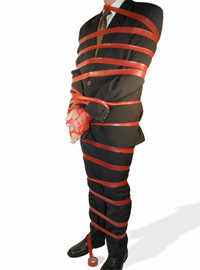Ride-share services benefit consumers, but the taxi commission doesn’t want to give us a good deal.
The regulatory knives are out for Uber and Lyft, two ride-sharing services that make life easier for consumers and provide employment opportunities in a stagnant economy. Why are regulators unhappy? Basically, because these new services offer insufficient opportunity for graft.
Services like Uber and Lyft disrupt the current regulatory environment. I have the Uber app on my phone. If I need a car in areas where Uber operates, it looks up where I am using GPS, matches me with participating drivers nearby, and in my experience gets me a Town Car in just a few minutes. It’s the comfort of a limo service, with the convenience of a taxicab. I get a better service, the driver gets a job, but now there’s competition for those entrenched companies.
In most cities, traditional taxi services are regulated by some sort of taxi commission. Similarly, limo services — the ones that provide the black Town Cars favored by big shots (and used by many Uber drivers) — are regulated by some sort of livery office. The rules strictly forbid the two sectors of the market from competing with one another. And, generally, entry is limited so that neither faces too much competition in general. In holding down competition, these regulators act on behalf of the entities they supposedly regulate for the benefit of consumers.
They do this because consumers typically pay very little attention to taxi and limo regulations while the regulated industries, unsurprisingly, pay very close attention. They express their gratitude in a variety of ways, some legal, and the regulators in turn look after the interests of the regulated. Consumer well-being is a far less significant concern.
In the world of Administrative Law, this phenomenon is known as “regulatory capture.” Set up a government agency to regulate an industry, and in short order it will wind up regulating on behalf of that industry. (One example is the District of Columbia Taxicab Commission, which has been doing its best to block ride-sharing services.) Look at almost any established regulatory regime, and the regulatory environment will tend to favor entrenched cab companies over new entrants. This is no accident.
And when new competition shows up? That’s when the regulators ride to the rescue. Austin, Texas, is impounding cars of drivers for ride-sharing services. The DMV of Gov. Terry McAuliffe’s Virginia is also trying to ban Uber and Lyft.
Regulators — and the industries they protect — will try to tell you that all this regulation is in service of consumer protection. Why, if you use an unlicensed, unregulated car service, you might be robbed, raped or overcharged! As if those kinds of things never happen in ordinary cabs or limos. (Actually, I think services like Uber and Lyft are actually safer, since they keep a clear record of when, where, and by whom riders are picked up, and track the cars involved.)
The truth is that although occupational regulation is usually presented as a protection for consumers, it’s usually demanded by the regulated industries themselves, and not by consumers at all. That’s not surprising, because it’s usually the regulated industries and the well-off people controlling them who benefit. In Chicago, a taxi medallion (license) costs $360,000 while the actual drivers — employed by the medallion owner — can earn less than minimum wage. And consumers pay higher taxi rates because of reduced competition.
It’s not just car-sharing services that suffer regulatory attack, of course. A public-interest law firm called the Institute for Justice has made a career out of attacking dumb occupational regulations. In my hometown of Knoxville, Tenn., the Institute sued to strike down a state law requiring that caskets be sold only by licensed funeral directors, who were charging about doublewhat their competitors asked. And, despite the Institute’s best efforts, this sort of restriction is growing: According to University of Minnesota Professor Morris Kleiner writing in The New York Times, “In the 1970s, about 10% of individuals who worked had to have licenses, but by 2008, almost 30% of the work force needed them.”
Why should florists, or interior decorators, be licensed? At a time when the economy is stagnant and jobs are scarce, it’s hard to justify regulatory schemes that protect fat cats with political connections while making it harder for individuals to find work.
There may be hope for change. Sen. Mike Lee, R-Utah, has called for federal legislation to limit state protectionism, open up these formerly unlicensed occupations, and make it easier for people to enter them. In a tough job market, taking away protections from established interests and offering workers new opportunities to get ahead seems like a good idea to me.
. . . . . . . . . . . . . . . .
Glenn Harlan Reynolds, a University of Tennessee law professor, is the author of The New School: How the Information Age Will Save American Education from Itself. This article was published at USA Today.
